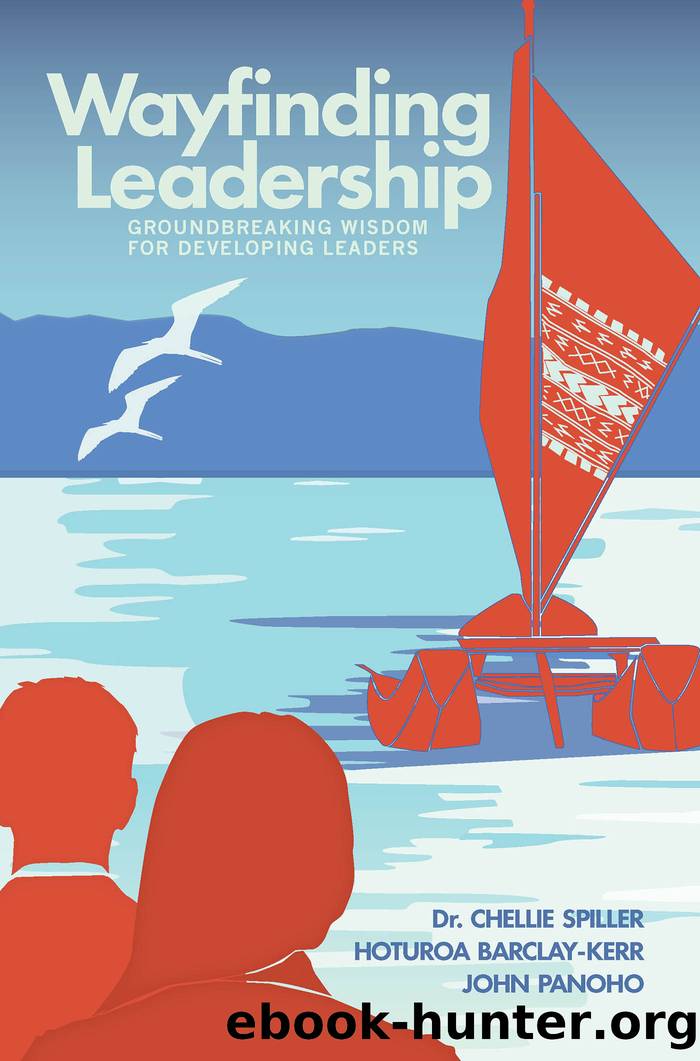Wayfinding Leadership by Chellie Spiller

Author:Chellie Spiller
Language: eng
Format: epub
Publisher: Huia (NZ) Ltd
On the waka, whÄnau (family) is the most important of all
Source: John Panoho
If the steerer pushes too far one way or the other on the hoe, the waka wonât get to where it needs to go. This is an apt analogy for our lives. If we are caught up in our problems, hooked on our personality and judging others for theirs, we are in danger of clouded thinking. We are no longer response-able; we are being touchy and reactive.
A key practice for Wayfinders is enquiring. This includes asking questions particularly of yourself and taking time to reflect. To see ourselves authentically therefore â all our parts, not just those that we deem positive and âgoodâ â we must enquire within. Socrates said, âThe life which is unexamined is not worth living.â The hoe is a reflection of this axiom, and Ko wai au? (Who am I?) speaks to this enquiry. The purpose of the journey of self-enquiry is to be able to see our deeper layers â to see that our responses and reactions affect the direction of our own lives.
In its popular book Leadership and Self-Deception, the Arbinger Institute shows how leaders deceive themselves by being blind to the truth about themselves, which distorts their view of others and of circumstances. This self-deception clouds a leaderâs ability to make wise and astute decisions. The book tells the story of a senior executive, Tom, who is called to a mentoring session with his boss, and is confronted with his self-deceptive behaviour. The story is a composite one based on many years of research conducted by the Arbinger Institute, in which researchers learned that âthe biggest problem is when we canât see we have a problemâ. Tom thinks that the problems he has at work and at home are because of other people, he thinks he is just doing his âjobâ but doesnât see that he is actually being a jerk and hurting others in subtle and not-so-subtle ways. The process he goes through with his boss is one of slowly waking up to who he is really being and confronting his poor behaviour. He sees how he has been damaging relationships.
The Arbinger Instituteâs research demonstrates how individuals become so blinkered by their own closed perspective of what the truth might be, that they resist any suggestions that the truth might be otherwise. The authors liken self-deception to being âin the boxâ. When a person is in the box, then not only are they failing to truly recognise and see themselves, but they also fail to recognise that others and circumstances are partly the way they are because they are being provoked into resistance. The message is this: âWhen weâre in the box, our view of reality is distorted â we see neither ourselves nor others clearly. We are self-deceived. And that creates all kinds of trouble for the people around us.â140
When we are in the box, the Arbinger Institute explains, we think it is others that have the problem. Our strategies of self-deception are inexorably self-justifying and in our favour.
Download
This site does not store any files on its server. We only index and link to content provided by other sites. Please contact the content providers to delete copyright contents if any and email us, we'll remove relevant links or contents immediately.
Hit Refresh by Satya Nadella(8344)
The Compound Effect by Darren Hardy(7574)
Change Your Questions, Change Your Life by Marilee Adams(6654)
Nudge - Improving Decisions about Health, Wealth, and Happiness by Thaler Sunstein(6642)
The Black Swan by Nassim Nicholas Taleb(6203)
Daring Greatly by Brene Brown(5650)
Deep Work by Cal Newport(5494)
Principles: Life and Work by Ray Dalio(5333)
Rich Dad Poor Dad by Robert T. Kiyosaki(5162)
The Myth of the Strong Leader by Archie Brown(4795)
Man-made Catastrophes and Risk Information Concealment by Dmitry Chernov & Didier Sornette(4748)
Big Magic: Creative Living Beyond Fear by Elizabeth Gilbert(4734)
The Slight Edge by Jeff Olson(4726)
Discipline Equals Freedom by Jocko Willink(4641)
Digital Minimalism by Cal Newport;(4566)
The Motivation Myth by Jeff Haden(4534)
Stone's Rules by Roger Stone(4422)
Management Strategies for the Cloud Revolution: How Cloud Computing Is Transforming Business and Why You Can't Afford to Be Left Behind by Charles Babcock(4135)
The Doodle Revolution by Sunni Brown(4049)
